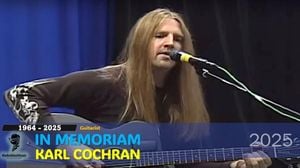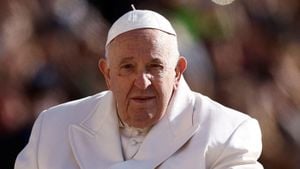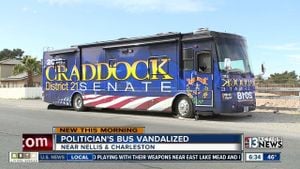Poland's President Andrzej Duda met with former U.S. President Donald Trump during the Conservative Political Action Conference (CPAC) this weekend, resulting in mixed reactions from politicians and the public back home. The meeting, which lasted only minutes, was viewed by some as emblematic of the strong ties between the two countries, yet others criticized its brevity as disrespectful.
After the meeting, Duda expressed satisfaction with the discussions, particularly highlighting Trump's assertion of military support for Poland. "The president confirmed his expectation of strengthening rather than reducing the presence of U.S. troops here," Duda stated. He felt reassured by Trump's remarks indicating Poland as one of America’s most reliable allies.
Notably, the conversation also touched upon the situation in Ukraine, with Duda relaying Trump's apparent concern over the war's toll, especially on civilians. "The president said his heart breaks when he sees destroyed Ukrainian cities, emphasizing the need to end the war," Duda recounted during his media briefing following the encounter.
According to Duda, Trump indicated the only way to resolve the conflict was through dialogue with Russian President Vladimir Putin, raising questions about who could effectively negotiate peace. "I told the president, first and foremost, we need to secure Poland and Central Europe's safety," Duda added, hinting at the broader security discussions the leaders had.
Despite the positive statements from Duda, reactions at home were polarized. Members of the ruling coalition, particularly from the Law and Justice (PiS) party, defended the meeting. Sebastian Kaleta, a PiS politician, stated, "President Trump demonstrated Poland's commitment to security issues, which is why he engaged with Duda prior to his speech at CPAC. This reinforces the importance of U.S.-Polish relations on the global stage." Kaleta argued the brief meeting was still significant, considering the stature of the U.S. president.
Contrastingly, many opposition figures criticized the nature and timing of the meeting. Former Prime Minister Donald Tusk was among those who took to social media, warning against taking the situation lightly. Tusk said, "There is nothing to laugh about. Let’s be serious, as the situation has grown increasingly grave." His comments reflect the view among opposition leaders who saw the meeting's duration as undermining Poland's standing.
The short nature of the meeting, which supposedly started late and lasted approximately ten minutes, sparked significant media commentary. Bartosz Arłukowicz from the opposition coalition commented ironically on Trump's request for Duda to stand before the audience, saying, "A president of a large country. Poland. Flying across the ocean. Stand up, show yourself." This sentiment was echoed by others who questioned the effectiveness of such truncated discussions.
Many within Duda's inner circle defended the time constraints. Andrzej Dera, the Secretary of State at the Polish President's Office, argued, "With friends like Trump, discussions are often direct and to the point, not requiring prolonged negotiations. Quality over quantity matters here, and the key issues for Poland were addressed." Dera described Duda's visit as productive, emphasizing the necessity of strong U.S.-Poland relations.
Despite the varying perspectives, Duda confirmed Trump planned to visit Poland, speculating on the timing being connected to upcoming international conferences, such as the Three Seas Summit or the NATO Summit. This anticipated visit has generated interest among both supporters and critics.
Discussions during the meeting also included economic ties, with Duda mentioning the construction of Poland's first nuclear power plant utilizing American technology. He emphasized the importance of U.S. investment and cooperation, addressing the economic side of the U.S.-Polish relationship.
Many analysts have interpreted the entire episode as indicative of broader geopolitical dynamics, with Poland positioning itself as a key ally for the U.S. amid rising regional tensions. The polarized political reactions reflect the complexity of international diplomacy.
Looking forward, the Polish government aims to strengthen its strategic alliance with the United States, with the geopolitical climate pushing nations like Poland to fortify their defenses against external threats. Both leaders' discussions about military presence and economic ties suggest long-term strategies to reinforce these bonds.
While the meeting’s short duration and the surrounding commentary may overshadow the intended messages, Duda's meeting with Trump undeniably highlights the importance of the U.S.-Polish alliance, especially amid the tumultuous backdrop of European security challenges and future military collaborations.



